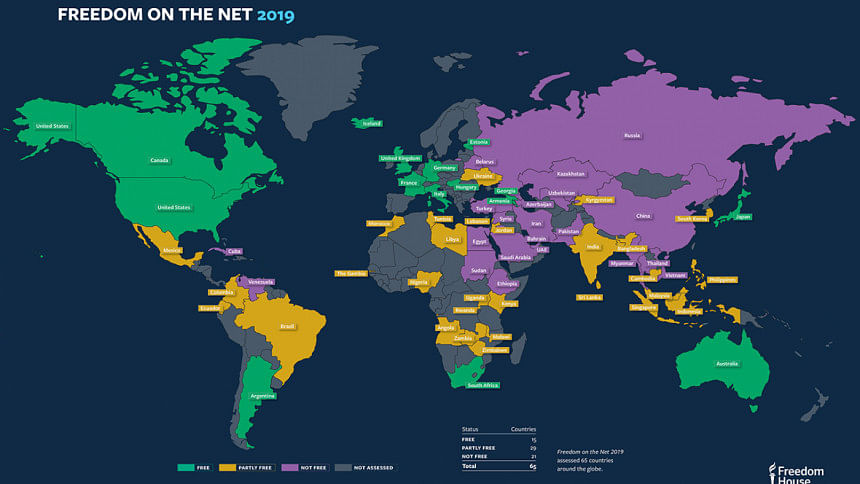Bangladesh 'partly free' in internet freedom: Study

Bangladesh is “partly free” in terms of using internet, according to the latest report of Freedom House.
Freedom House, a global organisation working for the expansion of freedom and democracy, conducted the survey titled "Freedom on the Net" assessing 65 countries including Bangladesh on their levels of internet and digital media freedom.
Bangladesh has scored 44 points and categorised “partly free” while Iceland topped the list with 95 out of a possible hundred.
The methodology that includes 21 questions and nearly 100 sub-questions has been divided into three categories -- Obstacles to Access, Limits on Content and Violations of User Rights.
Based on the score, Freedom House assigns the following internet freedom ratings: 100-70 = Free, 69-40 = Partly Free, 39-0 = Not Free.
Of the 65 countries assessed, 33 have been on an overall decline since June 2018, compared with 16 that registered net improvements. The biggest score declines took place in Sudan and Kazakhstan followed by Brazil, Bangladesh, and Zimbabwe, according to the report.
The number of internet users in Bangladesh is steadily increasing, the report added.
“More than 90 percent of users access the internet via mobile service providers, which recently began offering faster 4G service. Users continue to complain about the high cost of private internet service. Restrictions on connectivity to mobile internet service and social media platforms increased in the coverage period, notably during key political events,” it said.
“Constraints on internet freedom in Bangladesh tightened during the coverage period. The government used a variety of methods to restrict the online space; authorities blocked critical websites, circumscribed mobile networks to limit communication and mobilisation, announced new surveillance programs, and arrested journalists and users alike,” the report said.
Pressure on online journalists and activists peaked around mass protests calling for improved road safety and other reforms, as well as the 2018 general elections, which were marred by election irregularities and violence, the report mentioned.
Even after the elections, in 2019, authorities blocked a number of critical news sites, revealing its continued desire to suppress dissenting voices, it added.

 For all latest news, follow The Daily Star's Google News channel.
For all latest news, follow The Daily Star's Google News channel. 



Comments